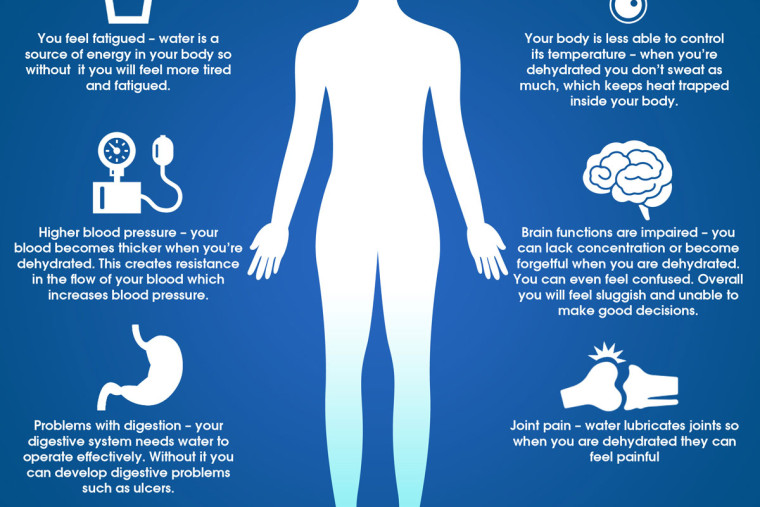Hydration is all about balance as your body needs water for a number of different bodily functions. This includes everything from lubricating joints to helping your digestive system to keeping your skin healthy. What happens when you’re dehydrated, though?
Here are seven things that dehydration does to your body.
- You feel fatigued – water is a source of energy in your body so without it you will feel more tired and fatigued.
- Higher blood pressure – your blood becomes thicker when you’re dehydrated. This creates resistance in the flow of your blood which increases blood pressure.
- Problems with digestion – your digestive system needs water to operate effectively. Without it you can develop digestive problems such as ulcers.
- Your body is less able to control its temperature – when you’re dehydrated you don’t sweat as much, which keeps heat trapped inside your body.
- Brain functions are impaired – you can lack concentration or become forgetful when you are dehydrated. You can even feel confused. Overall you will feel sluggish and unable to make good decisions.
- Joint pain – water lubricates joints so when you are dehydrated they can feel painful
- Premature aging – dehydration makes your skin look wrinkled and leathery, making you appear older
Symptoms Of Dehydration
The best way to avoid dehydration is to drink regularly throughout the day so that your body remains in balance. It is important that you know and recognize the symptoms of dehydration, though.
Mild dehydration symptoms include:
- Thirst
- Dry mouth
- Fatigue
- Headache
- Not going to the toilet as often as normal
- Dry skin
- Skin that is not as elastic as normal
- Dark colored urine
- Constipation
- Feeling dizzy
- Feeling lightheaded
- Muscle cramps
- Bad breath
- Feeling grumpy or cranky
Severe dehydration symptoms include:
- Rapid breathing
- Rapid heartbeat
- Severe dizziness
- Feeling severely lightheaded
- Feeling delirious
- Fainting or falling unconscious
- Not urinating
- Very dark colored urine
- Very dry and shrivelled skin
- Eyes that have a sunken appearance
- Extreme feelings of thirst
- Low blood pressure
- Not sweating when normally expect to
One way you can test for moderate and severe hydration is by doing a skin turgor test. It involves pinching the skin on the back of your hand. If the skin returns slowly to its normal state you are probably dehydrated. Slowly means it takes longer than a couple of seconds.
Dehydration can have short term and long term impacts on health, so the best advice is to maintain the water balance in your body and stay hydrated.


